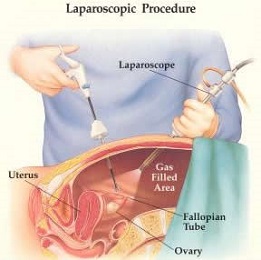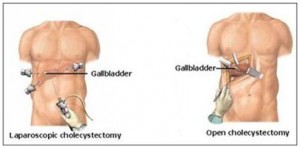What is Minimally Invasive Surgery / Laparoscopic Surgery?
Minimally invasive surgery is performed through very small incisions in the abdomen, using laparoscope and specialized instruments. This type of surgery is also called keyhole surgery.The laparoscope is a long thin instrument with a light source at its tip, to light up the inside of the abdomen or pelvis. The camera carries images to a video monitor, which the surgeon can view in real time. Specialized surgical instruments can be inserted through the laparoscope.

What Surgeries Can be Done by Laparoscopy?
- Appendectomy (appendix surgery) Hernia repair (including a ventral and hiatal hernia, and through small incisions nearby
- Laparoscopy is used either to treat the problem (laparoscopic surgery) or to diagnose it (diagnostic laparoscopy)
- With laparoscopy, the doctor can identify diseased organs, take tissue samples for biopsy, and remove abnormal growths
- Cholecystectomy (Gall-bladder surgery)
- Chronic pancreatitis and cancer Pancreas surgery
- Fundoplication for GERD
- Myotomy for achalasia
- Adhesiolysis
- Colon cancer and diverticular disease
- Hysterectomy (uterus removal)
- Tubal ligation (family planning surgery)
Other Minimally Invasive Surgeries
- Piles painless stapler surgery
- Doppler guided HAL & HAL RAR for piles
- Endoscopic nose and sinus surgery
- Balloon sinuplasty
What are the Advantages of Laparoscopic Surgery?
01
Fast recovery
02
Short hospital stay
03
Less post-operative pain
04
Better cosmetic results
Comparison Between Open and Laparoscopic Surgery

Laparoscopic Surgery
- Small Incisions (less than ½ an inch)
- Hospital stay is 1 to 3 days
- Patients usually return to work in 5 to 10 days
- Lesser risk of Infection
- Less pain
- Less chance of hernias
Open Surgery
- Large Incision
- Hospital stay of about 5 days
- Return to work in about 4 weeks
- Greater risk of infection
- More painful
- More chance of hernias
Pre-Operative Instructions
- Fasting (nil by mouth) for 6 hours prior to surgery preferably 12 hours
- Your doctor may ask you to drink a laxative to cleanse your intestine
- Stop (smoking, alcohol, tobacco chewing) 7 days prior to surgery
- Take (anti-thyroid medicine and anti-hypertensive) with a sip of water on the day of surgery prior to it
- Stop taking aspirin, products that contain aspirin, or certain blood thinner medications. May have to take these medicines with advice of doctor, who has prescribed it
- Get admitted without wearing any ornaments / threads / bracelets / ring etc, as it will not be allowed in the operation theatre
- Arrange for someone to take you to the hospital the day of surgery, and to stay with you following surgery
Post-Operative Instructions
- No bed rest is advised
- Do all your daily activities like: (bathing, going to washroom etc)
- Take small frequent meals rather than having 2-3 heavy meals per day
- Do not lie-down immediately after meals
- Avoid spicy / oily foods for 3-4 weeks post surgery
- Have plenty of oral fluids and high fiber diet to avoid constipation
- Do not lift heavy weights and do strenuous exercise or work for at least 1½-month post surgery
- Avoid (yoga, kapalbhati, etc,) for at least 1-month post surgery
- Wear abdominal binder while rising up from the bed and lying down to avoid strain over the abdomen
- Do not wear belt while sleeping
- Bring all the reports and discharge summery while coming for follow-up
- If you have any problems and queries, please contact doctor
Our Specialist

Dr. Nitish Jhawar
M.S., FMAS, FIAGES, FALS, FACRSI
Fellow Advance Laparoscopic Surgery
Fellow Colorectal Surgery USA
Senior Laparoscopic & Colorectal Surgeon
Phone No: +91 9322 229 159
Email Id: info@neoalta.com

